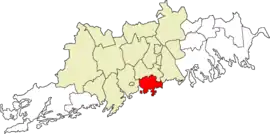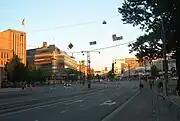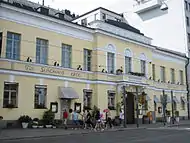Helsinki
Helsinki (Swedish: Helsingfors) is the capital city of Finland. Helsinki is the largest city in Finland. 604,380 (31.12.2012) people live in Helsinki, and 1,360,000 live in the Helsinki metropolitan area.
Helsinki
Helsinki – Helsingfors | |
|---|---|
City | |
| Helsingin kaupunki Helsingfors stad City of Helsinki | |
 Clockwise from top: Helsinki Cathedral, view of central Helsinki, Headquarters of Sanoma, Helsinki city centre at night, beaches at Aurinkolahti, Parliament House and Suomenlinna. | |
 Coat of arms | |
| Nickname(s): Stadi, Hesa[1] | |
 | |
| Coordinates: 60°10′15″N 024°56′15″E | |
| Country | |
| Charter | 1550 |
| Capital city | 1812 |
| Area (2018-01-01)[2] | |
| • Total | 715.48 km2 (276.25 sq mi) |
| • Land | 213.75 km2 (82.53 sq mi) |
| • Water | 501.74 km2 (193.72 sq mi) |
| • Rank | 258th largest in Finland |
| Population (2019-01-31)[3] | |
| • Total | 650,058 |
| • Rank | Largest in Finland |
| • Density | 3,041.21/km2 (7,876.7/sq mi) |
| Population by native language | |
| • Finnish | 84.3% (official) |
| • Swedish | 6.1% |
| • Others | 9.6% |
| Population by age | |
| • 0 to 14 | 14.3% |
| • 15 to 64 | 68.3% |
| • 65 or older | 17.4% |
| Time zone | UTC+02:00 (EET) |
| • Summer (DST) | UTC+03:00 (EEST) |
| Municipal tax rate[6] | 18% |
| Website | www.hel.fi |


Helsinki is in the south of Finland, on the coast of the Gulf of Finland. The city is in the Uusimaa region. When one looks from Helsinki, Tallinn is on the opposite side of the sea, but it is too far away to see. A poetic name for Helsinki is "the daughter of the Baltic Sea".
History
In 1550, Swedish king Gustav Vasa commanded people to build a new city and move there. His idea was to build a new place to trade, which would be more popular than Tallinn. The idea did not work well, and many people returned from Helsinki to their homes. Later Sweden built the fortress Suomenlinna in Helsinki. After Russia had taken Finland from Sweden in several wars, they started developing Helsinki. Helsinki became the capital of autonomous province of Finland. When Finland became independent in 1917, Helsinki stayed as the capital city.
Geography
Helsinki spreads around several bays and over several islands. Some famous islands include Seurasaari, Lauttasaari and Korkeasaari - which is also the country's biggest zoo - as well as the fortress island of Suomenlinna (Sveaborg).
The metropolitan area of Greater Helsinki also includes two of Finland's biggest cities, Espoo to the west of Helsinki, and Vantaa to the north. These two cities, along with Helsinki itself and the small town of Kauniainen (which is in fact surrounded by Espoo), make up the Capital Region (Pääkaupunkiseutu in Finnish or Huvudstadsregionen in Swedish). There are other towns nearby that are part of Greater Helsinki, including Järvenpää, Kerava, Tuusula, Nurmijärvi, Sipoo, Kirkkonummi, Mäntsälä and Vihti. They have become popular places for Helsinki commuters to live.
Transport
The public transportation network in Helsinki and its area consists of
- many bus routes serving most of the region. They are operated by different companies under contract to HSL.
- one metro line (with two branches) between Helsinki and its eastern suburbs. The line first opened in 1982 and was extended to Espoo in 2017. The line was extended with five new stations in 2022, continuing the Espoo metro.
- eleven tram lines, located mostly in the city centre. A light rail line serving the northern suburbs has been completed in 2023.
- several commuter trains between Helsinki and nearby cities. Some lines go as far as Lahti, Riihimäki and Hanko.
Helsinki Airport is located in Vantaa about 20 kilometers north of Helsinki city center. The airport offers both domestic flights within Finland and international flights to Europe, Asia and North America.
Helsinki offers several boat services to Tallinn and Stockholm every day, along with ferries to places including the island of Suomenlinna.
Gallery
 G.W. Sundmans Krog, a restaurant
G.W. Sundmans Krog, a restaurant Silja Symphony in the South Harbor of Helsinki
Silja Symphony in the South Harbor of Helsinki
References
- Ainiala, Terhi (2009). "Place Names in the Construction of Social Identities: The Uses of Names of Helsinki". Research Institute for the Languages of Finland. Retrieved 22 September 2011.
- "Area of Finnish Municipalities 1.1.2018" (PDF). National Land Survey of Finland. Retrieved 30 January 2018.
- "Suomen virallinen tilasto (SVT): Väestön ennakkotilasto [verkkojulkaisu]. Tammikuu 2019" (in Finnish). Statistics Finland. Retrieved 15 March 2019.
- "Population according to language and the number of foreigners and land area km2 by area as of 31 December 2008". Statistics Finland's PX-Web databases. Statistics Finland. Retrieved 29 March 2009.
- "Population according to age (1-year) and sex by area and the regional division of each statistical reference year, 2003-2020". StatFin. Statistics Finland. Retrieved 2 May 2021.
- "List of municipal and parish tax rates in 2021" (PDF). Tax Administration of Finland. 1 December 2020. Retrieved 10 April 2021.
Other websites
- City of Helsinki web site - English version Archived 2016-03-30 at the Wayback Machine
- City portal of Helsinki - English version
- Finland Travel Community Archived 2020-08-09 at the Wayback Machine
- WorldFlicks in Helsinki: Photos and interesting places on Google Maps Archived 2007-12-11 at the Wayback Machine